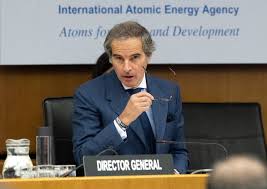
IAEA Warns Israel-Iran Conflict Poses Threat to Nuclear Sites and Diplomatic Efforts

 :
| Updated On: 17-Jun-2025 @ 1:47 pm
:
| Updated On: 17-Jun-2025 @ 1:47 pmSHARE
Rafael Grossi, Director General of the International Atomic Energy Agency (IAEA), has issued a serious warning over the escalating conflict between Israel and Iran, now entering its fourth day. He stated that the growing hostilities pose significant threats to both regional diplomacy and nuclear safety, and he has urged all involved parties to show maximum restraint.
Grossi delivered his remarks during an emergency session of the IAEA Board of Governors held on Monday in Vienna. He emphasized that the Middle East is at a critical turning point, with military escalation increasing the risks of human casualties and potential radiological disasters. Such a crisis, he warned, could also hinder the diplomatic process needed to ensure Iran does not acquire nuclear weapons in the long run.
The conflict has heightened concerns that attempts to revive stalled nuclear talks with Tehran could be irreparably harmed. Negotiations had already been under strain due to long-standing mistrust between Iran and the international community, made worse by former U.S. President Donald Trump's withdrawal from the 2015 Iran nuclear deal.
Grossi provided a technical update on the status of Iran’s nuclear facilities following Israeli airstrikes. One of the most significant incidents involved the Natanz uranium enrichment site, a key facility in Iran's nuclear program. Although the underground sections of Natanz were not directly hit, Grossi warned that critical equipment might have been damaged due to a power outage caused by the bombing.
Importantly, he reported that radiation levels outside the Natanz site remained normal and there was no indication of radioactive contamination spreading to surrounding areas. This suggested that, despite the attacks, there had been no immediate radiological hazard to the population or environment.
Beyond Natanz, four additional nuclear installations in Iran's Isfahan province were also damaged during the strikes. However, other key nuclear facilities — including the Fordow enrichment site, the Bushehr nuclear power plant, and a reactor currently under construction — appeared to be unaffected by the conflict.
Grossi assured that IAEA personnel remain present in Iran and are prepared to fully resume monitoring activities once the security situation improves. Their continued presence is vital for ensuring transparency and international oversight of Iran's nuclear program during this volatile period.
Meanwhile, within Iran, domestic political pressure is mounting. A draft bill reportedly being developed in the Iranian parliament could pave the way for the country to exit the Treaty on the Non-Proliferation of Nuclear Weapons (NPT). If passed, such a move would severely damage global efforts to prevent the spread of nuclear weapons.
Esmaeil Baghaei, spokesperson for Iran’s Ministry of Foreign Affairs, confirmed that the proposed legislation is still in its early stages and would need to be coordinated with members of parliament. He also reaffirmed Iran’s official stance that it does not seek to develop nuclear weapons, despite rising internal demands for a more aggressive posture in response to foreign threats.
The situation remains highly volatile, with the potential to escalate further, posing serious implications for international security, diplomacy, and nuclear non-proliferation efforts.
Contact Us
House. No. : 163, Second Floor Haridev Rd, near Puberun Path, Hatigaon,Guwahati, Assam 781038.
E-mail : assaminkcontact@gmail.com
Contact : +91 8811887662
Enquiry
×
Reporter Login
×